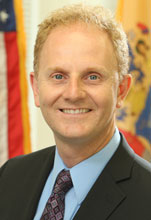DeAngelo Introduces Bill to Create Oversight Commission for Mercer County Public Water System

DeAngelo Introduces Bill to Create Oversight Commission for Mercer County Public Water System
Measure Establishes a 17-member Board to Establish Accountability,
Improve Service for All Trenton Water Works Customers
(TRENTON) – In continuing his efforts to address long-standing problems with the public water system serving much of Mercer County, Assemblyman Wayne P. DeAngelo (D-Hamilton) has introduced legislation that would create an oversight commission to ensure greater regional representation, economic accountability, and water quality for all towns serviced by the Trenton Water Works (TWW).
“During the last six months, after closely monitoring the affairs of Trenton Water Works, it has become abundantly evident that there needs to be greater oversight of Trenton Water Works. While there have been some steps taken, we cannot rely on legal orders to ignite any improvements. The steady, constant hand of an oversight commission would help to depoliticize the direct management of the water system and establish a clear accountability structure,” said DeAngelo, the chairman of the Assembly Telecommunications and Utilities Committee.
Under the legislation, the bill (A-4243), the 17-member Mercer Regional Water Services Commission would be established as on oversight body over certain operations. The Commission would be responsible for managerial and operational functions of TWW such as approving new, renewed or amended contracts of more than $10,000; fixing and collecting rates, fees, rents or other charges; and hiring, suspending or terminating managers or executive personnel.
It also would oversee compliance with the “Water Quality Accountability Act” and “Safe Drinking Water Act” and refer concerns regarding violations to DEP.
Further, the Commission would be empowered to hold hearings or refer matters to appropriate state departments or agencies on areas of concern such as water and service quality; infrastructure and reliability; disputed rates and fees of more than $1,000; misfeasance, malfeasance, or nonfeasance or an employee of TWW or other staffing matters.
“A balanced mixture of dedicated individuals from local elected offices, state agency professionals, and intelligent members of the public will be charged with the task of overseeing the services to thousands of residents,” said DeAngelo. “Residents of each of the towns serviced by Trenton Water Works would have representatives of their town and educated individuals as their eyes, ears and voices making sure they are getting clear water.”
If the bill is enacted, members of the Commission would include:
- The Mayor (or designee) and a designated council member of each of the towns services by Trenton Water Works – the City of Trenton, Hamilton Township, Ewing Township, Lawrence Township, and Hopewell Township;
- Representatives of the state Department of Environmental Protection (DEP), the state Department of Community Affairs (DCA), and the Board of Public Utilities (BPU); and
- A chairman plus three members of the public nominated by the Mercer County Executive for approval by the Board of Chosen Freeholders. These four private citizens would be residents of any of the towns serviced by Trenton Water Works but could not be currently holding elected office or employees of TWW, county, or municipal government serviced by the water system. They would need to demonstrate professional experience in engineering, public water or utility systems, or local, county, or state government services.
If signed into law, the measure would take effect immediately. Appointments to the Commission would be selected within 45 days of enactment. The Commission would be required to meet no less than once every 90 days.
Finally, the Commission would submit a report to the Governor and Legislature five years after enactment of the law on the analysis of its actions. Upon receipt of the report, the Legislation could adopt a joint resolution dissolving the Commission. If no joint resolution is filed, then subsequent reports would be filed biannually thereafter.
The bill will now be referred to a legislative committee for further action.







